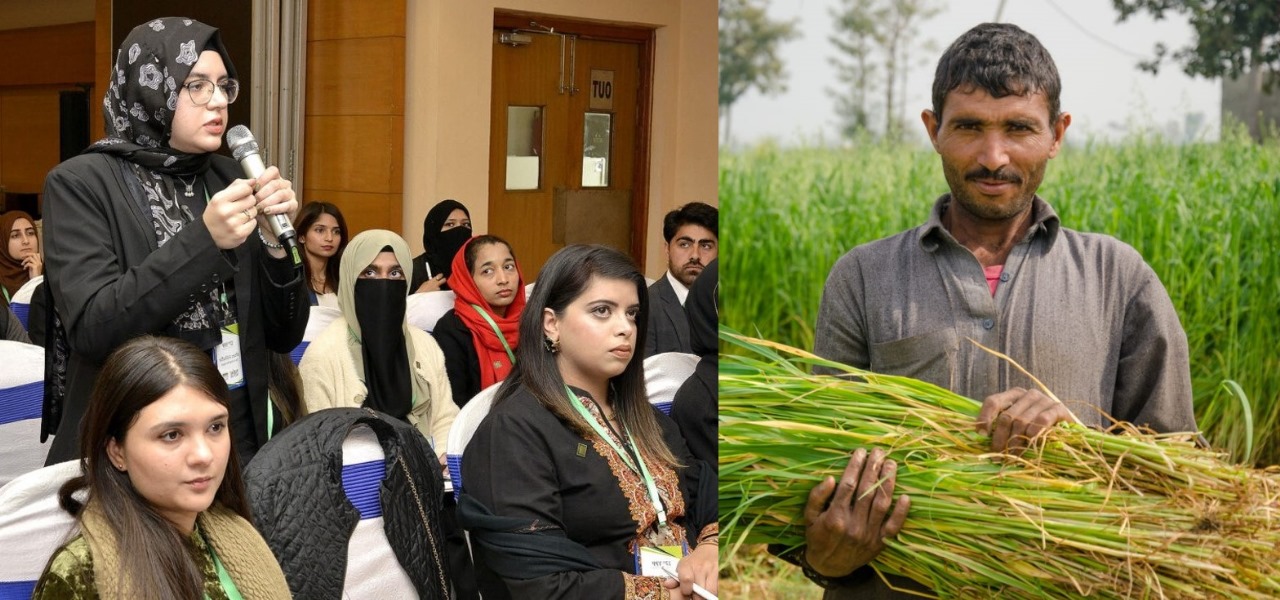Climate Resilience Starts with Youth
By Tahir Hasnain Shah
Climate change is a global challenge that knows no borders, affecting every corner of our planet. To combat this crisis effectively, it is essential to engage the minds and hearts of the younger generation, who will inherit the world we leave behind.
The urgency of climate change has never been more apparent, and Pakistan is not immune to its devastating effects. However, amidst these challenges, a new generation of climate advocates in Pakistan, including young architects for climate action, is welcoming and should be encouraged through all means. These young leaders are not just identifying issues but actively working on recommendations and policy solutions to tackle the climate crisis head-on.
As the world prepares for COP-28, the 28th Conference of the Parties to the United Nations Framework Convention on Climate Change (UNFCCC), Pakistan’s youth are rising to the occasion. They are not only aware of the looming climate threats but are also actively engaged and willing to be engaged further in addressing them.
The Urgency of Climate Action
The urgency of addressing climate change cannot be overstated. Pakistan, with its diverse geography and climate patterns, faces a myriad of environmental challenges. From frequent droughts to devastating floods, from water scarcity to receding glaciers, the impact of climate change is profoundly felt across the nation.
Young Pakistanis are witnessing these changes firsthand, and they understand that it is their future at stake. This realization has ignited a passion for climate action that is evident in their advocacy, projects, and innovations.
Policy Recommendations
These young leaders are not only advocating for individual actions but are also putting forth policy recommendations to address climate issues effectively.
- Renewable Energy Policies: Encourage and facilitate the transition to renewable energy sources, with incentives for clean energy production and consumption.
- Reforestation and Conservation: Implement policies to protect existing forests, support tree-planting initiatives, and promote sustainable forestry.
- Green Building Standards: Enforce green building standards and provide incentives for environmentally friendly construction.
- Waste Management Policies: Develop comprehensive waste management policies that prioritize reduction, recycling, and proper disposal.
- Climate Education in Schools: Introduce climate education in the school curriculum to foster awareness and action from an early age.
- Sustainable Urban Planning: Encourage sustainable urban planning, including green spaces, public transportation, and energy-efficient infrastructure.
Preparing Youth for Climate Resilience
As Pakistan confronts the formidable challenge of climate change, the youth have emerged as a powerful force for change. However, it is essential not only to empower them with knowledge and tools to tackle climate change but also to prepare them to be the stewards of a sustainable future. In light of this, here are some critical policy recommendations:
- Climate Education in School and College Curriculum
Incorporate Climate Change Education: The government should mandate the inclusion of climate change education in school and college curricula. Students must be equipped with a comprehensive understanding of climate issues, their role in mitigating climate change, and the potential solutions.
Cross-Curricular Integration: Climate education should be integrated into multiple subjects, such as science, geography, and social studies, ensuring a holistic understanding of the issue.
Hands-On Learning: Promote experiential learning by encouraging students to engage in practical activities related to climate change, like tree planting, waste reduction projects, and community clean-up drives.
- Protection Measures for Rural Youth
Rural Youth Support Programs: Establish programs that provide support, training, and resources to rural youth who are increasingly migrating to urban areas due to climate-related challenges in agriculture. These programs should focus on skills development, climate smart agriculture, and entrepreneurship opportunities in rural areas.
Access to Climate-Resilient Farming Techniques: Promote the adoption of climate-resilient farming techniques, such as drought-resistant crops and efficient water management practices. These initiatives will help rural youth continue their livelihoods without the need for mass migration.
Climate-Resilient Crop Insurance: Develop and implement climate-resilient crop insurance schemes that protect rural farmers and provide a safety net in the face of climate-related crop failures.
Community-Based Adaptation: Encourage the establishment of community-based adaptation projects in rural areas to address climate change impacts collectively. These projects can focus on water management, soil conservation, and sustainable land use practices.
Awareness Campaigns: Launch awareness campaigns targeting rural youth to inform them about climate change, its impacts on agriculture, and adaptation strategies. These campaigns should be conducted through various media channels, including FM radio, local events, and educational workshops.
- Collaboration between Government and Civil Society
Public-Private Partnerships: Foster partnerships between government agencies, private sector organizations, and civil society groups to facilitate youth training programs, awareness campaigns, and climate-resilient initiatives.
Youth Engagement Platforms: Create platforms that engage the youth in the policymaking process, allowing them to share their insights, concerns, and innovative solutions with decision-makers.
Monitoring and Evaluation: Implement mechanisms to monitor and evaluate the effectiveness of climate education and rural youth support programs. Regular assessments will help refine and improve these initiatives.
By adopting these policy recommendations, Pakistan can harness the energy, creativity, and passion of its youth to build a climate-resilient future. Educating the youth about climate change and providing support for rural communities are not just policy suggestions; they are critical steps towards a sustainable and resilient Pakistan. The youth are ready to lead the way, and it is our responsibility to empower and prepare them for the challenges of a changing climate.
________________________
(The writer is a seasoned researcher and development practitioner currently working as Senior Program Manager at Legal Rights Forum (LRF), a rights based advocacy NGO in Pakistan. He can be reached at tahir.hasnain@lrfpk.org)




